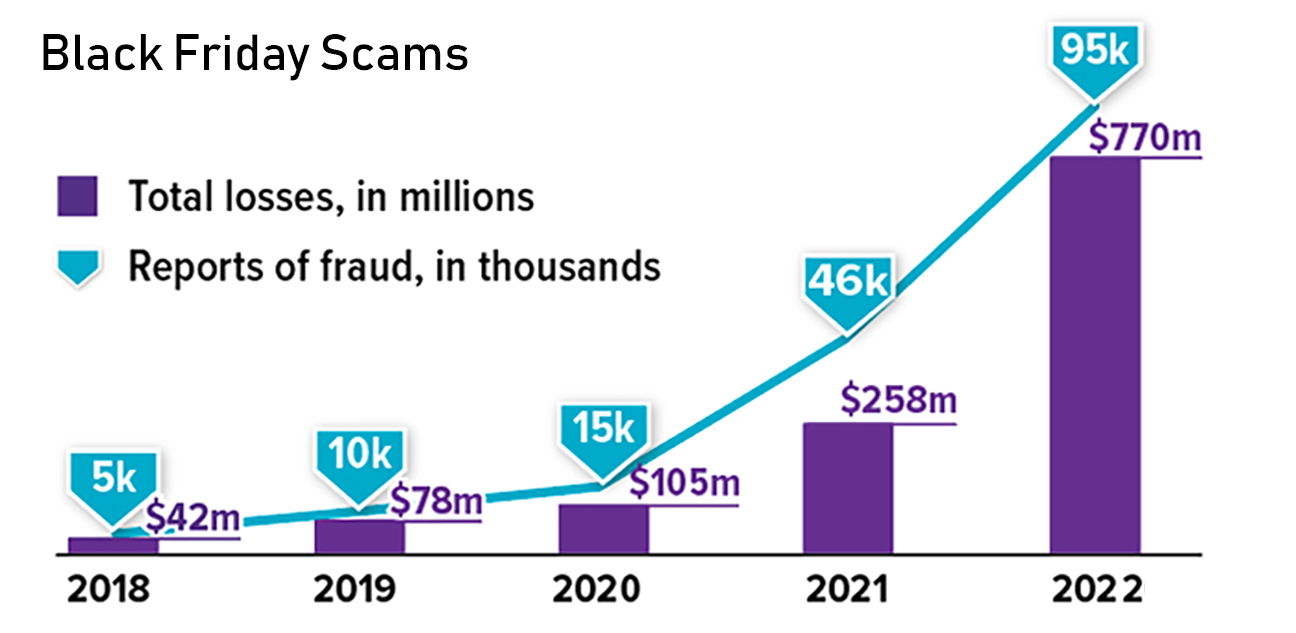Black Friday and Cyber Monday bring about a shopping frenzy, with consumers eager to snag the best deals before the holiday season. However, amidst the excitement, cybercriminals are on the prowl, ready to exploit unsuspecting shoppers. In this article, we look into the most common Black Friday Scams that target Black Friday shoppers and provide essential tips on how to safeguard yourself against these digital threats.

Incorrect Bank Details Scam: A prevalent scheme involves scammers sending emails claiming that billing information is incorrect, urging immediate action to avoid order cancellation. Shoppers should remain skeptical of urgent requests to change bank details and always verify such requests directly with the retailer using confirmed contact information.
Hot Deal Scam: While seeking hot deals during Black Friday, be cautious of fake websites advertising popular items at seemingly unbeatable prices. These scams result in payments for nonexistent products. Utilize resources like the Better Business Bureau to verify the legitimacy of both the product and the seller.
Phishing Emails: Phishing emails are a perennial threat, and Black Friday is no exception. Exercise caution with unfamiliar links, pop-ups, and suspect URLs lacking ‘https’ or a locked padlock symbol. Avoid disclosing sensitive information and only interact with reputable sources.
Fake Tracking Number Scam: Fraudsters employ fake package tracking notifications to distribute malware or direct users to phishing sites. Legitimate retailers do not send tracking numbers as email attachments. Always obtain tracking information directly from the retailer’s website or contact their customer service.
Instant Messages: Beware of suspicious messages containing links to reputed websites offering exclusive deals. Scammers replicate retailer websites, making it challenging to differentiate between genuine and fraudulent links. Verify deals by visiting the official retailer’s website directly.
Fake Charity Scam: During the holiday season, scammers exploit the spirit of giving by setting up fake charities. Identify red flags such as charities accepting only unconventional payments like gift cards, wire transfers, or cryptocurrency. Verify a charity’s legitimacy through reputable platforms like the Fundraising Regulator’s online directory.
Fake Social Media Profiles: Impersonating social media profiles is an easy task for scammers. Look out for aggressive advertising campaigns and always check for verified accounts or those with a significant following before interacting with seemingly official profiles.
Fake Product Reviews: Fake product reviews flood online marketplaces, often created by individuals paid by manufacturers. Cross-reference reviews from multiple reputable sources to ensure accuracy and authenticity before making a purchase.
‘Grey Market’ Distribution: Unauthorized sellers operating in the ‘grey market’ may mishandle products, complicating returns and exchanges. Stick to authorized channels to guarantee product quality and customer support.
Gift Card and Discount Scams: Perhaps one of the biggest Black Friday Scams. Exercise caution when buying gift cards at a discount, as scammers often sell empty or stolen cards. Purchase gift cards only from reputable sources, such as official retailer stores or websites. Similarly, verify the legitimacy of discounts and coupons received via email or social media before use.
As the holiday shopping season approaches, vigilance is key. By staying informed and adopting secure online practices, you can outsmart cybercriminals and ensure a safe and enjoyable shopping experience during Black Friday and Cyber Monday.






